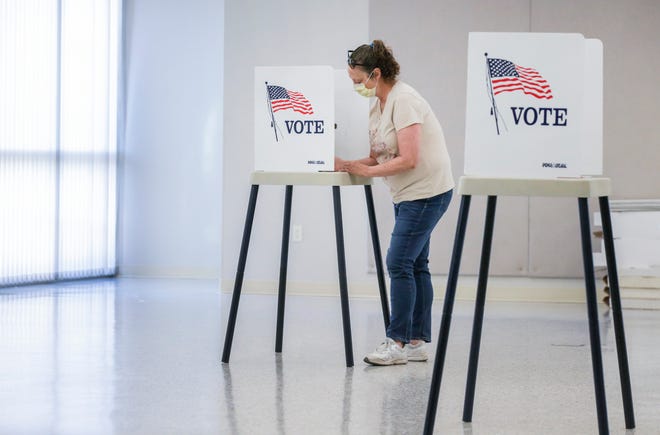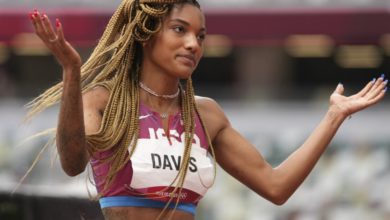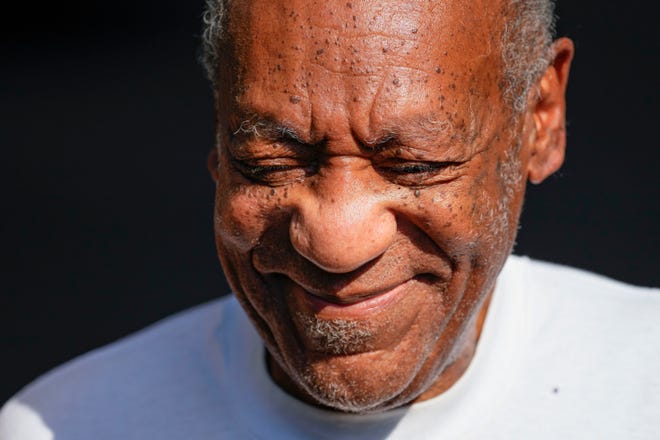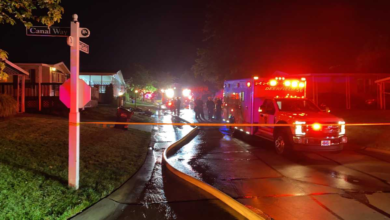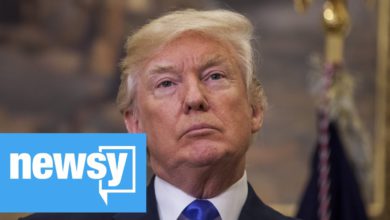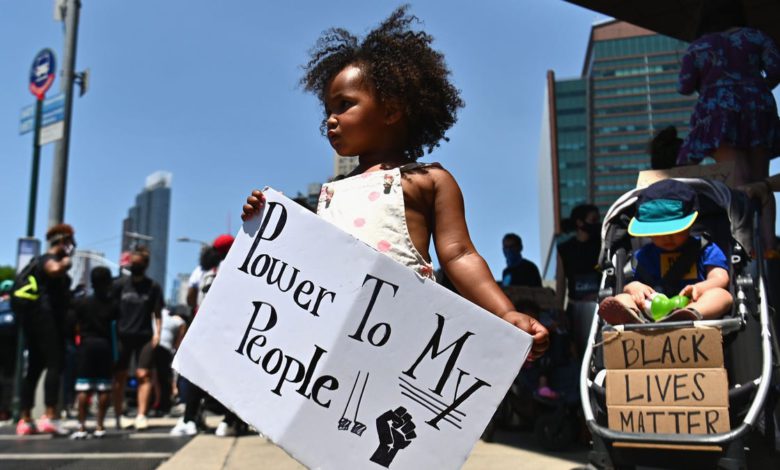
After police killed his son at his student apartment complex in Denton, Texas, Kevin Tarver waited to hear from the Black Lives Matter leaders he had long seen condemn similar police shootings on TV and social media.
He expected strategic advice. Help with funeral costs. At the very least, condolences.
Sixteen months later, no one from the national organization -- which last year reported a haul of $90 million -- has reached out to offer a word or help in his fight for justice.
“My son’s case is not bigger or smaller than anyone else’s,” Tarver said. “But to have that spotlight initiates pressure, and that’s not happening. When you’re raising millions of dollars, where is it going?”
As the country prepares to mark the one-year anniversary of the murder of George Floyd, an event that galvanized unprecedented support around the Black Lives Matter movement, Tarver’s case illustrates the mixed feelings and uncertainty that underlie the national organization as it moves forward.
How Black Lives Matter went from a hashtag to the largest movement in US history
From Trayvon Martin to George Floyd, the Black Lives Matter movement continues to highlight Black lives lost to police and racial injustice.
Just the FAQs, USA TODAY
What started as a hashtag is now the defining civil rights movement of its time. Driven by anger over the disproportionate violence against Black people at the hands of police, Black Lives Matter is a demographically broad crusade with global influence, indebted to its predecessors and yet completely of its moment – a viral phenomenon that snowballed with Floyd's murder, captured on cellphone video, prompting suburbs-deep protests and opening the door for major social change.
Broadly speaking, the Black Lives Matter movement has forged and inspired changes in social justice, law enforcement, politics, entertainment and education. Minneapolis and other cities restricted police chokeholds; Louisville, Kentucky, abolished no-knock warrants; police budgets were reallocated in Seattle, San Francisco, Philadelphia and Baltimore.
But the Black Lives Matter Global Network also faces questions about its leadership, dissent over what some perceive as a lack of financial transparency and resentment from some community groups and victims’ families over feeling unrecognized.

In 2020, the Black Lives Matter national organization divided into three parts: Black Lives Matter Global Network, the umbrella foundation; Black Lives Matter PAC; and Black Lives Matter Grassroots, which liaises with the network of local chapters, said Melina Abdullah, co-director of Black Lives Matter Grassroots.
Abdullah said the organization has strived to be transparent by publishing an impact report that details how funds were used and which political candidates it supported. She said that while organizers are in touch with many victims' families, and some local chapters help out with funeral costs, the larger organization is focused on changing policies rather than providing supportive services.
"When you think about the fact that more than 1,000 people are killed at the hands of police every single year, Black Lives Matter can't support every family who experiences the murders of their loved ones at the hands of police," she said.
Some allies point to wider successes the movement has helped nurture as evidence of the group's importance.
Despite its minimal organization, “it’s bigger than that,” said Marc Morial, president of the National Urban League. “It’s a consciousness movement.”
The moment, he said, is similar to the civil rights movement of the 1960s, when many local leaders and citizens were as involved in social change as Martin Luther King Jr. and other iconic figures.
“While Dr. King and Whitney Young and John Lewis were well-recognized leaders, they were not orchestrating every move,” Morial said. “There were thousands of local leaders.”
More recently, President Joe Biden has asked Congress to pass a major police reform bill – the George Floyd Justice in Policing Act – by Tuesday, the anniversary of Floyd’s death. The bill has passed the House and is pending a Senate vote, but is unlikely to meet Biden's deadline.
“The fact that we’re on the precipice of debating the George Floyd bill…. That would not have been a possibility five years ago,” said longtime Atlanta organizer LaTosha Brown, for whom the Black Lives Matter mantra was the impetus she needed in 2016 to co-found the nonpartisan civic engagement group Black Voters Matter.
But some families wounded by police killings said they expect more from Black Lives Matter organizers.

Darius Tarver, 23, was killed in January 2020 by officers in Denton, Texas, where police say the criminal justice major charged at the officers wielding a cleaver and frying pan. Tarver's father, Kevin Tarver, a police department chaplain in nearby McKinney, contends that his son would still be alive had the incident been handled differently.
“Sometimes they’re credited for things they’re not involved in,” said Denton’s Tarver, who is concerned that families don't see the benefits of the BLM movement's support.
Those whose losses fuel the movement are left to fend for themselves, he said, creating GoFundMe pages to cover expenses and foundations seeking justice for their loved ones.
That’s what he did for his son, Darius Tarver, a criminal justice major at the University of North Texas who had suffered a traumatic head injury the week before the January 2020 incident in Denton, about 40 miles northwest of Dallas. That night, neighbors called 911 to report that the 23-year-old was acting erratically, wielding a cleaver and frying pan and banging on other people’s doors in his apartment complex.
Police said Darius Tarver refused to drop the items and charged at the officers, who shocked him twice with a stun gun before firing the fatal shots.
Kevin Tarver, who works as a police department chaplain in nearby McKinney, contends that if the incident had been handled differently – and by people trained to handle those with mental imbalance – his son would still be alive.
In March, a Denton County grand jury declined to indict any officers. Officials did not cite a reason.
Tarver's activism has found him offering emotional support to other families who have lost loved ones to police violence. He recently returned from Monroe, Louisiana, where he visited the family of Ronald Greene, 49, a Black man who died in 2019 after being tased, hog-tied, beaten and dragged following his failure to stop for a traffic violation. Police initially told Greene’s family he died of crash-related injuries.
“Once you’ve been inducted into this club that no one wants to be in, you have to learn to survive,” Tarver said. “Those families are lost and don’t know how to move forward. They don’t know how to create the friction that’s needed or the organizations, so we have to help each other. If Black Lives Matter actually operated the way you think it would, it would help them get to this next step. It would help them create these organizations.”

As protests raged over the death of Floyd and as the COVID-19 pandemic disproportionately claimed the lives of people of color, the Black Lives Matter Global Network raised $90 million through its foundation.
The foundation doled out $21.7 million in funding to 11 local chapters, as well as six-figure grants to 30 local organizations, including numerous LGBTQ groups such as Trans United, Transgender Law Center, Africans Rising and BYP100, according to its 2020 impact report.
“We are no longer a small, scrappy movement,” the report said. “We are an institution. We are mature. We are a growing entity developing its stake in the philanthropic world.”
In many ways, the Black Lives Matter national organization is still a majority volunteer-led organization made up of 20 global chapters that meet weekly on Sundays. There is an executive director and a handful of consultants, but no permanent staff.
Abdullah said one of the things the report doesn't reflect is the organization did not have financial resources for the first seven years of its activism.
"Black Lives Matter was financed out of our own pockets, out of the pockets of people who gave us their Starbucks money," Abdullah said. "No one was paid. We did this work because we believed it to be our sacred duty."
Now, with a war chest of $60 million, the Black Lives Matter Global Network Foundation has created an endowment and wants to provide grants to Black-led organizations.
The Black Lives Matter PAC raised just over $1 million in 2020, according to Federal Electoral Commission reports and the Center for Responsive Politics, a nonpartisan research group based in Washington, D.C. The PAC endorsed at least 44 candidates, including U.S. Reps. Cori Bush of Missouri and Jamaal Bowman of New York, and worked to get voters out during elections in Arizona, Colorado, Georgia, North Carolina, Pennsylvania, South Carolina and Wisconsin.

Alicia Garza, from left, Patrisse Cullors and Opal Tometi, co-founders of the Black Lives Matter movement, arrive at the Glamour Women of the Year Awards at NeueHouse Hollywood on Monday, Nov. 14, 2016, in Los Angeles.
The dispute over the national group’s transparency spilled into the open in December, when a group of major metropolitan chapters issued a statement announcing their departure from the global network, adding to the criticism leveled at the network by the mothers of some of those killed, including Breonna Taylor and Tamir Rice.
“In our experience, chapter organizers have been consistently prevented from establishing financial transparency, collective decision making or collaboration on political analysis and vision within BLMGN,” read the statement, signed by chapters in Philadelphia, Chicago, New Jersey, San Diego, Denver, Oklahoma City and Washington, D.C., among others.
In a separate statement in February announcing its break from the network, California’s Black Lives Matter Inland Empire chapter said it would restructure with the name Black Power Collective.
“We no longer feel, as we initially did, that our politics align,” the chapter said. “The use of the BLM name, which we believed was intended to unify our struggle, has been commodified and debased. It is now being used to sell products, acquire book deals, TV deals and speaking engagements.”
Morial, the National Urban League president, warned that reducing this latest civil rights movement to a single organization “misses the point.”

Some of the movement’s biggest gains, he said, involve independent actors and institutions pledging resources, such as Citibank’s announcement in September that it would commit $1 billion to Black-owned businesses and expand homeownership access for Black Americans.
The Ford Foundation, among the country’s largest foundations, also pledged and additional $180 million in October to several Black-led advocacy organizations, increasing its total contribution to organizations fighting anti-Black racism to $330 million throughout 2021.
In Los Angeles, school board President Kelly Gonez met with local BLM activists shortly after Floyd's death, in the weeks before the city’s Unified School District replaced 70 school police officers with "school climate coaches" and approved a $36.5 million plan to boost Black student achievement.
More than 90% of the district's nearly 600,000 students are students of color, and Gonez said many joined last spring's protests after Floyd's death. While students and their families have pushed for reforms such as discontinuing random metal-detector searches, it was BLM-focused protests, she said, that provided the necessary push.

"What we heard directly from the students was the trauma they faced in having police on campus every day. The voices became louder, and there was momentum and widespread public desire to act," Gonez said.
In Seattle, activists who for years lacked even "two pennies to rub together" saw momentum shift as young people took to the streets after Floyd’s death and statewide donations poured in, said Sakara Remmu, lead strategist for the Washington Black Lives Matter Alliance.
"That was the moment that we knew the window had flown open and it was time," said Remmu, 43.
Within months, activists had won a commitment from King County Executive Dow Constantine to shutter the county jail, long criticized as a place where Black inmates were hurt or killed at rates exceeding national averages.
Rashad Robinson, president of the racial-justice movement Color of Change, said he sees more Black activists assuming leadership positions – but not by forcing others out.
“There’s absolutely an opportunity and a space for many types of leadership," Robinson said. "Color of Change didn’t ask anyone for a place at the table. We built it. And we didn’t ask anyone to step aside."
Meanwhile, other chapters, like South Carolina’s Independent Black Lives Matter Chapter of Charleston, is pushing for an audit of racial bias in the city’s police department and reallocation of public safety funds, measures that don’t require being an official BLM chapter.

The Black Lives Matter of Greater New York chapter also opted not to affiliate, feeling the national group’s leaders were more concerned with “art and literature” than forging urgent, systemic change, said chapter co-founder Chivona Newsome.
"We knew that we needed a direct and radical response to what was happening," said Newsome, 36. "I know they raise a lot of funds, but I've never seen them on the ground."
Newsome said the Minnesota chapter turned to her group for help in the hours after Floyd's death, entrusting their social media accounts to the New York-based team to run – and teach – their playbook for humanizing police-shooting victims.
"We know that we have to change the police narrative, to humanize that person, so the world can look at that picture and say, 'Hey, that could be my neighbor," she said.
Chief among the chapter's successes last year was the passage of a police reform bill that New York Gov. Andrew Cuomo signed in June after massive protests in New York City. Though the group had previously demonstrated after the 2014 death of Eric Garner at the hands of New York police, this time was different.
"The world had to process a Black man dying, on film," Newsome said. "The world could not ignore the plight of the people. And it showed that the true power belongs to the people."

Black Lives Matter’s success is built atop decades of previous work.
Pamela Oliver, a professor emerita of sociology at the University of Wisconsin at Madison who has studied protest movements for 40-plus years, said the generations-old struggle for Black rights had gained significant momentum until the events of 9/11 diverted national attention. Activists have been trying to make up lost ground ever since, she said – including the additional loss of some white allies in 2016 after the fatal ambush of five police officers in Dallas by Micah Johnson, a Black man.
Then, in 2020, came the murder of Floyd, whose very public death induced previously unseen levels of national anguish even though Black and Latino men had been dying at the hands of police for generations.

"I have white friends who missed the point of Black Lives Matter in 2014 and 2016, but the George Floyd movement really caught their attention," Oliver said. "But the minute that those protests started, the Black activists were ready to go. Because they never stopped."
The uprisings didn’t come without backlash. Nearly 100 bills restricting the right to protest have been introduced nationwide since Floyd's death, according to the International Center for Not-For-Profit Law, based in Washington, D.C. In April, Florida Gov. Ron DeSantis signed an “anti-riot” bill granting immunity to motorists who drive through protest crowds.
Trahern Crews, co-founder of the Black Lives Matter Minnesota chapter, said that while some old-school activists urge patience, the time for waiting is over.
"You can't tell the youth to wait," Crews said. "They know this is a matter of survival.”
No one knows that more than the families of those lost to police violence.
Like Denton’s Tarver, several others were disappointed to not hear from the Black Lives Matter organization and were left to figure out how to fight their battles alone, efforts they felt haven’t been sufficiently recognized.
“When Antwon was killed, I didn’t get a phone call, not an email, nothing,” said Michelle Kenney, whose son Antwon Rose II, 17, was fatally shot by police in Pittsburgh in June 2018. “Not one person from Black Lives Matter showed up in Pittsburgh or reached out to me.”

Instead, Kenney’s Antwon Rose II Foundation has fought for justice without national support.
“We are doing the work, pushing for five bills here in Pennsylvania with five different lawmakers,” she said. “Demonstration without legislation means nothing. They had a choice to be part of this. We didn’t.”
In Fort Worth, Texas, Ashley Carr and her siblings founded The Atatiana Project in their sister’s name to offer youth science and arts opportunities, both special to Atatiana Jefferson, a biology major and choir member who had hoped to attend medical school. Jefferson was fatally shot in her home in October 2019 after a neighbor called to report an open door.
“When there’s a police killing, there should be some boots on the ground, some interaction with that family,” Carr said. “You can’t say Black Lives Matter, but then decide which lives matter.”
Alissa Charles-Findley, whose 26-year-old brother, Botham Jean, was fatally shot in September 2018 by an off-duty Dallas police officer who said she mistook him for an intruder, said she heard from many people after the tragedy -- “but Black Lives Matter was not one of them.”

Charles-Findley said the efforts of community activists and the families themselves aren’t sufficiently recognized.
“Who is it that’s really in your face?” she asked. “Is it Black Lives Matter? We do that daily, and we don’t get paid for it. Local movements are the ones really driving any change that we’re seeing.”
She and several other victims’ families, for instance, recently met in Washington with several Republican legislators, she said, pushing passage of the George Floyd Justice in Policing Act in the U.S. House.
She and Kenney asked the national Black Lives Matter organization to put a disclaimer on its website to let the public know that the money organizers were raising does not go to the families of police shooting victims.
"It’s deceptive when they don’t indicate that, and I don’t think everyone understands,” Kenney said.
Some families affected by police killings, however, said all the responsibility to organize should not fall on the national organization.
Cephus X. Johnson, who goes by the nickname "Uncle Bobby," has crusaded against police violence since the killing of his nephew, Oscar Grant, in 2009 in Oakland, California.
"There's a misconception that Black Lives Matter is a charity organization that gives money to families, which has never occurred," said Johnson, who co-founded the Love, Not Blood campaign in California with 300 families who has lost loved ones to police violence.
He said he's always had a "great" relationship with the national organization and its founders, but their job "is much bigger than police violence."
"It's about empowering Black life...to whatever areas are a detriment to our existence," he said.
Source link

